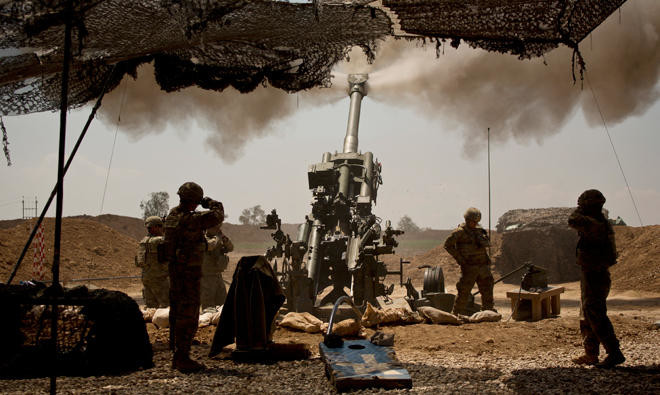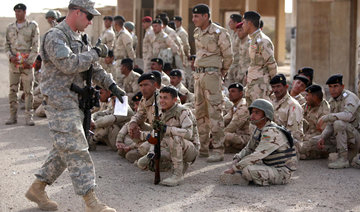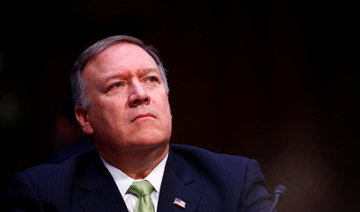BAGHDAD: Two major Iraqi Shiite groups backed by Iran are demanding all US forces leave Iraq, opposing plans by Baghdad and Washington to keep some there for training and advisory purposes.
An Iraqi government spokesman said on Monday US forces — who number more than 5,000 — had begun reducing their numbers but some would remain.
The Badr Organization, a Shiite group that has a minister in Prime Minister Haider Al-Abadi’s government, in charge of the interior, said any remaining US, troops would be cause for instability.
“The two governments should coordinate to ensure a full withdrawal. US presence will be cause for internal polarization and a magnet for terrorists,” Badr spokesman Kareem Nuri said.
Kataib Hezbollah, a more militant, secretive and anti-American group, repeated threats to attack US forces.
“We are serious about getting the Americans out, using the force of arms because the Americans don’t understand any other language,” its spokesman, Jaafar Al-Husseini, told Beirut-based Al-Mayadeen TV on Monday evening.
Kataib Hezbollah has strong links to Iran’s Revolutionary Guards Corps and has threatened to attack US forces several times in the past, describing their presence as an occupation.
A US official in Baghdad said: “We take anything that sounds like a threat from anyone against Americans seriously.”
“There’s not that many of us here and we are all operating within Iraqi military bases. A lot of this is frankly just political posturing and trying to take advantage of stories in the press to make broader political points,” he added.
The US-led international military coalition helped Iraqi forces recapture territory taken by Daesh in 2014 and 2015, providing air and artillery support in the battle to for Mosul, and trained tens of thousands of elite Iraqi soldiers.
“The coalition will tailor our forces in consultation with our Iraqi partners in order to ensure the lasting defeat of Daesh,” the coalition’s director of operations, Brig. Gen. Jonathan Braga, said in a statement on Monday.
Braga said that even if the composition of the force changes, the coalition would maintain the capabilities and presence to continue to train, advise and equip Iraqi forces to ensure that Daesh does not re-emerge.
US officials said that while Daesh has lost most of the territory it once controlled in Iraq and Syria, there is concern about surviving fighters returning to insurgency tactics.
Iran-backed groups urge full US withdrawal from Iraq
Iran-backed groups urge full US withdrawal from Iraq

South Sudan opposition says under fresh govt military attack
“Clashes are still ongoing and details will follow later“
JUBA: South Sudan’s opposition accused government forces of attacking one of its military positions in Central Equatoria State on Tuesday as their fragile power-sharing agreement continues to unravel.
Central Equatoria State, which includes the capital Juba, was split into areas controlled by government and opposition forces under a 2018 power-sharing deal that ended South Sudan’s five-year civil war, in which an estimated 400,000 people died.
The agreement brought President Salva Kiir and his long-time rival, Vice President Riek Machar, together in a unity government.
But the deal has been unraveling in recent months as Kiir moves to sideline Machar, who was placed under house arrest last month.
“The SSPDF (South Sudan People’s Defense Forces) has attacked Panyume cantonment site from multiple directions this morning,” opposition party spokesman Lam Paul Gabriel said on Facebook.
“Clashes are still ongoing and details will follow later,” he added.
Facing sustained attacks on its positions, the opposition forces commander directed his troops to prepare for conflict, according to another statement by Gabriel on Tuesday.
“Lt. Gen. Peter Thok Chuol hereby directs all sectors, divisions and all units of the SPLA-IO (Sudan People’s Liberation Army in Opposition) to be vigilant and promptly defend themselves and the civilians under their control areas,” he said.
Israeli strikes kill 14 in Gaza and destroy heavy equipment needed to clear rubble

- An Israeli strike on Jabaliya municipality's parking garage destroyed nine bulldozers provided by Egypt and Qatar
- The strikes also destroyed a water tanker and a mobile generator provided by aid groups
DEIR AL-BALAH, Gaza Strip: Israeli strikes on the Gaza Strip killed at least 14 Palestinians, mostly women and children, and destroyed bulldozers and other heavy equipment that had been supplied by mediators to clear rubble.
Israel’s 18-month offensive against Hamas has destroyed vast areas of Gaza, raising fears that much of it may never be rebuilt. The territory already had a shortage of heavy equipment, which is also needed to rescue people from the rubble after Israeli strikes and to clear vital roads.
A municipality in the Jabaliya area of northern Gaza said a strike on its parking garage destroyed nine bulldozers provided by Egypt and Qatar, which helped broker the ceasefire that took hold in January. Israel ended the truce last month, renewing its bombardment and ground operations and sealing the territory’s 2 million Palestinians off from all imports, including food, fuel and medical supplies.
The strikes also destroyed a water tanker and a mobile generator provided by aid groups, and a truck used to pump sewage, the Jabaliya Al-Nazla municipality said.
There was no immediate comment from the Israeli military on the strikes.
Israeli strikes kill 14, mostly children
An Israeli airstrike early Tuesday destroyed a multistory home in the southern city of Khan Younis, killing nine people, including four women and four children, according to Nasser Hospital, which received the bodies. The dead included a 2-year-old girl and her parents.
“They were asleep, sleeping in God’s peace. They had nothing to do with anything,” said Awad Dahliz, the slain girl’s grandfather. “What is the fault of this innocent child?“
A separate strike in the built-up Jabaliya refugee camp killed three children and their parents, according to the Gaza Health Ministry’s emergency service.
Israel’s air and ground war has killed over 51,000 Palestinians, mostly women and children, according to the ministry.
The war began when Hamas-led militants attacked southern Israel on Oct. 7, 2023, killing some 1,200 people, mostly civilians, and taking 251 people hostage. They are still holding 59 hostages, 24 of whom are believed to be alive, after most of the rest were released in ceasefire agreements or other deals.
Hamas has said it will only free the remaining hostages in return for the release of Palestinian prisoners, a full Israeli withdrawal and a lasting ceasefire. Israel has said it will keep fighting until the hostages are returned and Hamas has been either destroyed or disarmed and sent into exile. It has pledged to hold onto so-called security zones in Gaza indefinitely.
Syria detains two leaders of Palestinian Islamic Jihad

- The group said the men had been detained “without any explanation of the reasons“
- An official from Syria’s interior ministry confirmed the detentions
DAMASCUS: Syrian Arab Republic authorities have detained two senior members of the Palestinian militant faction Islamic Jihad, which took part in the October 2023 attacks on Israel from Gaza, the group’s armed wing and a Syrian official said on Tuesday.
In a statement, the Al Quds Brigades said Khaled Khaled, who heads Islamic Jihad’s operations in Syria, and Yasser Al-Zafari, who heads its organizational committee, had been in Syrian custody for five days.
The group said the men had been detained “without any explanation of the reasons” and “in a manner we would not have hoped to see from brothers,” and called for their release.
An official from Syria’s interior ministry confirmed the detentions, but did not respond to follow-up questions on why the pair had been arrested. A Palestinian source in Damascus also confirmed the arrests.
Islamic Jihad joined its ally Hamas, Gaza’s ruling group, in the attack on Israel in 2023. It is a recipient of Iranian funding and know-how, and has long had foreign headquarters in Syria and Lebanon.
But its allies in both countries have recently suffered devastating blows: an Israeli air and ground offensive last year severely weakened the Lebanese Iranian-backed group Hezbollah, and Syria’s leader Bashar Assad, closely allied to Tehran, was ousted by a rebel offensive last year.
The new Islamist leadership in Damascus has cut diplomatic ties with Iran and is hoping to rebuild Syria’s regional and international backing, not least to eliminate sanctions and fund reconstruction after a brutal 14-year civil war.
The US has given Syria a list of conditions to fulfill in exchange for partial sanctions relief, Reuters reported last month. Sources said one of the conditions was keeping Iran-backed Palestinian groups at a distance.
Israel has carried out strikes against Islamic Jihad in Syria for years. Last month, it said it struck a building on the outskirts of Damascus that it said Islamic Jihad was using as a command center, an assertion denied by the group.
Gaza ‘land of desperation’ after 50 days of total siege: UN

- UNRWA chief Philippe Lazzarini: ‘Hunger is spreading and deepening, deliberate and manmade’
- ‘Humanitarian aid is being used as a bargaining chip and a weapon of war’
GENEVA: The United Nations warned Tuesday that Gaza was facing deepening hunger 50 days into a total Israeli blockade on all aid entering the war-ravaged Palestinian territory.
“Gaza has become a land of desperation,” Philippe Lazzarini, head of the UN agency for Palestinian refugees UNRWA, said on X.
“Hunger is spreading and deepening, deliberate and manmade.”
After 18 months of devastating war and an Israeli blockade on aid since March 2, the UN has warned of a dire humanitarian situation for the 2.4 million inhabitants of the Palestinian territory.
Israel has accused the Palestinian militant group of diverting aid, which Hamas denies.
The heads of 12 major aid organizations warned last Thursday that “famine is not just a risk, but likely rapidly unfolding in almost all parts” of the territory.
“You can see a clear tendency toward total disaster,” Jens Laerke, spokesman for the UN humanitarian agency OCHA told reporters in Geneva Tuesday.
“It is true that right now is probably the worst humanitarian situation we have seen throughout the war in Gaza.”
In his post on X, Lazzarini questioned “how much longer until hollow words of condemnation will translate into action to lift the siege, resume a ceasefire and save whatever is left of humanity?”
The UNRWA chief decried that two million people in Gaza, most of them women and children, “are undergoing collective punishment.”
“The wounded, sick and elderly are deprived of medical supplies and care,” he said, even as humanitarian organizations like UNRWA have thousands of trucks waiting with supplies that risk expiring.
“Humanitarian aid is being used as a bargaining chip and a weapon of war,” he charged.
“The siege must be lifted, supplies must flow in, the hostages must be released, the ceasefire must resume.”
Hamas team heads to Cairo for Gaza talks as Israel strikes kill 26

- The renewed effort follows Hamas’s rejection last week of Israel’s latest proposal
- Gaza’s civil defense agency said that a spate of Israeli air strikes since dawn on Tuesday killed at least 26 people
CAIRO: A Hamas delegation departed for Cairo to discuss “new ideas” aimed at securing a ceasefire in Gaza, an official from the group said, as Israeli air strikes killed 26 people across the territory Tuesday.
The renewed effort follows Hamas’s rejection last week of Israel’s latest proposal to secure the release of hostages still held in Gaza.
Talks have so far failed to produce any breakthrough since Israel resumed its air and ground assault on Gaza from March 18, ending a two-month ceasefire.
“The delegation will meet with Egyptian officials to discuss new ideas aimed at reaching a ceasefire,” the Hamas official said, adding the team included the group’s chief negotiator Khalil Al-Hayya.
The latest round of discussions come a day after newly appointed US ambassador to Israel, Mike Huckabee, urged Hamas to accept a deal that would secure the release of hostages in exchange for the entry of humanitarian aid into Gaza.
“When that happens, and hostages are released which is an urgent matter for all of us, then we hope that the humanitarian aid will flow and flow freely knowing it will be done without Hamas being able to confiscate and abuse their own people,” Huckabee said in a video statement.
Israel blocked all aid to Gaza on March 2, days before launching its renewed offensive.
Israel has accused the Palestinian militant group of diverting aid, which Hamas denies.
“Gaza has become a land of desperation,” Philippe Lazzarini, head of the UN agency for Palestinian refugees UNRWA, said on X on Tuesday.
“Hunger is spreading and deepening, deliberate and manmade.... Humanitarian aid is being used as a bargaining chip and a weapon of war.”
Qatar, with the United States and Egypt, brokered a truce in Gaza between Israel and Hamas which began on January 19 and enabled a surge in aid, alongside the exchange of hostages and prisoners.
But that truce collapsed after disagreements emerged over the terms of the next stage.
Hamas had insisted that negotiations be held for a second phase of the truce, leading to a permanent end to the war, as outlined in the January framework.
Israel, by contrast, sought an extension of the first phase.
Following the impasse, Israel blocked aid to Gaza and resumed its military campaign.
Most recently, Israel proposed a 45-day ceasefire in exchange for the release of 10 living hostages — an offer Hamas rejected last week.
Gaza’s civil defense agency said that a spate of Israeli air strikes since dawn on Tuesday killed at least 26 people across the territory.
Among the fatalities were nine people when a house was struck in central Khan Yunis, Mohammad Mughayyir, a senior official from the agency told AFP, adding that six others remain trapped under the rubble.
More than 10 houses were also destroyed in the strikes, civil defense spokesman Mahmud Bassal earlier told AFP, adding that an air strike also destroyed bulldozers and equipment belonging to the Jabalia municipality in northern Gaza.
The Israeli military did not immediately comment on the latest strikes.
At least 1,890 people have been killed in Gaza since the military resumed its offensive, bringing the total death toll since the war erupted to at least 51,266, according to the health ministry in Hamas-run Gaza.
Hamas’s attack on Israel on October 7, 2023, which ignited the war, resulted in the deaths of 1,218 people, mostly civilians, according to an AFP tally based on official Israeli figures.
Militants also abducted 251 people, 58 of whom are still held in Gaza, including 34 the Israeli military says are dead.


















